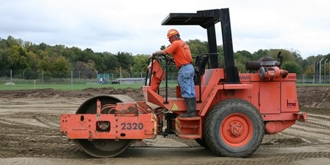Lancaster Excavation - Specialist Excavation Solutions in Lancaster, OH
Comprehensive Excavation Strategies: Grasping the Basics for Success
In the realm of building and construction and civil design, the relevance of efficient excavation strategies can not be overemphasized. The cautious preparation, specific execution, and careful interest to information needed in excavation projects demand a thorough technique that includes numerous essential facets. From first soil analysis to the execution of precaution and normal progression surveillance, understanding these core elements is vital for attaining success in any type of excavation venture. Nevertheless, the true mastery lies not merely in recognizing these fundamentals but in perfectly integrating them to browse the intricacies of excavation projects with skill.
Recognizing Excavation Job Planning

The first stage of any excavation task is the planning phase, where critical choices are made that can significantly impact the end result of the job. Comprehending the project spending plan, range, and timeline constraints is vital for producing a comprehensive excavation strategy that ensures the job's success.
One key facet of excavation project preparation is the development of a comprehensive timeline that describes the series of milestones, target dates, and tasks. This timeline acts as a roadmap for the project team, permitting them to track progress and make essential adjustments to make sure the job remains on timetable. Additionally, a well-defined budget that makes up all expenses, consisting of equipment service, labor prices, and materials, is important for staying clear of price overruns and delays. By very carefully considering all these factors during the drawing board, excavation jobs can be executed efficiently and effectively, leading to effective results.
Soil Analysis and Site Evaluation
Performing extensive dirt evaluation and website analysis is a crucial action in the prep work phase of any excavation project. Soil analysis involves determining the structure, framework, and residential properties of the soil at the excavation website. This information is crucial for comprehending the soil's bearing ability, wetness content, and possibility for erosion, which are essential factors in determining the excavation techniques and tools required for the job.
Site assessment exceeds soil analysis and incorporates a broader evaluation of the general site conditions. This analysis includes determining any type of prospective hazards, such as underground utilities, environmental concerns, or unpredictable terrain, that can affect the excavation procedure. By extensively examining the website, job supervisors can develop effective excavation techniques that prioritize safety and security, performance, and ecological security.
Making use of advanced technologies like ground-penetrating radar, soil tasting, and drone studies can boost the accuracy and efficiency of dirt evaluation and site examination. Investing time and sources in these initial actions can ultimately conserve time and stop costly hold-ups or difficulties throughout the excavation procedure.
Devices Option and Use
Efficient excavation projects count greatly on strategic tools option and utilization to make certain ideal performance and performance. Choosing the right equipment for the task is important in taking full advantage of efficiency and decreasing downtime. Variables such as the kind of soil, deepness of excavation, and task scope play a significant role in identifying one of the most suitable devices for the task handy.

Along with picking the appropriate devices, appropriate utilization is key to job success. Operators needs to be educated to handle the tools safely and successfully - lancaster trenching. Normal upkeep checks and prompt fixings aid avoid break downs and make sure regular efficiency throughout the job
Safety And Security Steps and Regulations Compliance
In the world of excavation projects, focusing on precaution and conformity with laws is critical to making sure a protected and legally sound operational environment. Security procedures incorporate an array of methods, including conducting extensive site assessments, implementing correct signs and obstacles, and offering sufficient safety and security training for all personnel involved in the excavation process. Adherence to regulations, such as OSHA demands in the United States, makes certain that the excavation job fulfills the necessary standards to safeguard workers, bystanders, and the surrounding atmosphere.

Tracking Progression and Adjusting Techniques
Exactly how can project supervisors efficiently track the innovation of excavation jobs and adapt their approaches accordingly to enhance end results? Monitoring progression is crucial for ensuring that excavation projects stay on track and meet target dates.
Final Thought
Finally, grasping the basics of thorough excavation strategies is vital for the success of any type of job. By understanding task preparation, assessing dirt and website problems, selecting suitable devices, abiding by safety and security policies, and keeping an eye on progression, job managers can make certain a reliable and smooth excavation procedure. Executing these methods will certainly cause effective end results and decrease potential risks or setbacks during the excavation job.
The first stage of any excavation project is the preparation stage, where vital choices are made that can considerably affect the end result of the job. Understanding the project timeline, scope, and spending plan constraints is vital for creating an extensive excavation plan that ensures the job's success.
Just how can forecast managers efficiently track the advancement of excavation tasks and adjust their techniques accordingly to optimize end results? By closely keeping an eye on progress and being ready to adjust techniques, task go right here supervisors can boost the overall success of excavation projects.
By comprehending job preparation, assessing dirt and website conditions, choosing ideal equipment, abiding with safety policies, and monitoring progress, task supervisors can make certain a smooth and efficient excavation procedure.